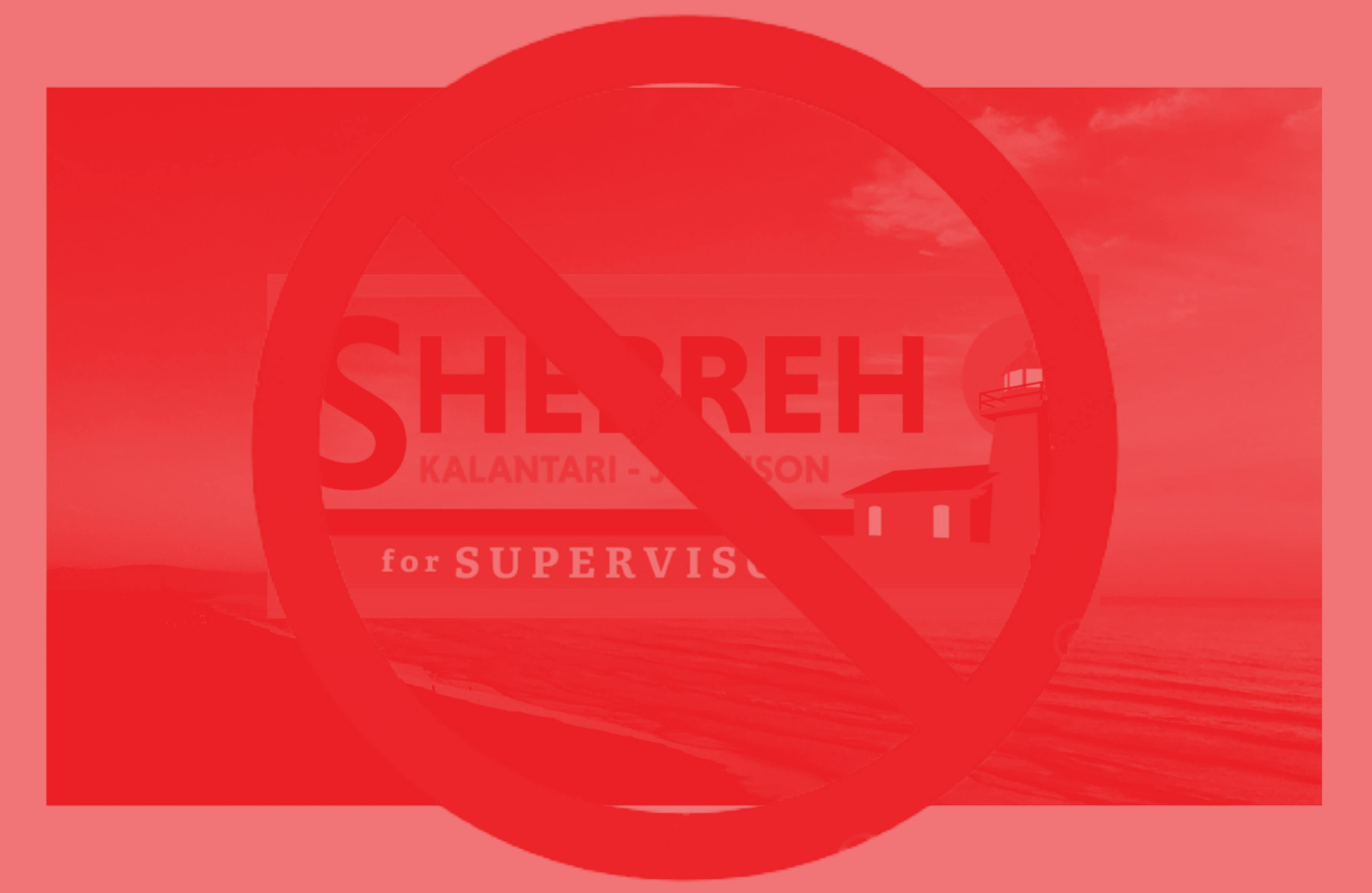
Not to Be Trusted: The Care-Washing Politics of Shebreh Kalantari-Johnson
On her campaign website, Kalantari-Johnson points to her supposed landmark policy triumphs, the notorious Camping Services and Standards Ordinance (CSSO) and Oversized Vehicle Ordinance (OVO). These are hardly matters to be proud of. Both, she claims, have created “policies that set parameters on time, place, and manner for encampments and oversized vehicles while successfully advocating for services such as safe sleeping, transitional shelter, and safe parking.” It’s a prime example of her ability to euphemize the criminalization of poverty in the same breath as creating justification for it.
Given her politics, it's not surprising that the same reactionary, pro-landlord sources that financed the Recall Glover and Krohn and anti-rent control campaigns remain behind her, and in fact Kalantari-Johnson was both pro-Recall and anti-Measure M, which, if passed, the latter would have brought meaningful tenant protections to Santa Cruz renters. With approximately half of her campaign financing coming from out-of-county sources (including a $1000 donation from the LA-based California Real Estate Political Action Committee), not only is her run anti-democratic—failing to represent her prospective constituency—her supervisorship risks being beholden to out-of-county interests. If elected to supervisor, where she would have more direct power over county homelessness services and more, Shebreh—as she’s commonly referred to in her campaign publicity—would be disastrous for the wellbeing of our unhoused neighbors, Santa Cruz renters, and for Santa Cruz County more broadly.
With a background in social work, but more recently in community development and fundraising, Shebreh emphasizes her experience working directly with unhoused people in San Francisco’s Tenderloin. Yet even so, she has consistently created and advocated for policies that violate best practices as defined by homeless advocacy groups and social scientists who study homelessness, and the American Public Health Association, among others. Instead of using her background as a social worker to educate her constituency about the futility and cruelty of criminalizing homelessness, she has taken her fluency in the language of liberal advocacy and consistently used it to deflect and distract from the ways OVO and CSSO will actively destabilize life for those who live outside or in their vehicles. In this regard, her positions resonate with the right-wing, vigilante-driven, anti-houseless, and pro-policing group Take Back Santa Cruz. In this town where casting oneself Republican is generally a nonstarter, it’s the “moderate” Democrats like Shebreh who represent ruling-class interests.
CSSO and OVO together criminalize the specific acts of sleeping in a tent, sleeping in one's “oversized” vehicle, or occupying space with any amount of trash. These are facts that (to our knowledge) Shebreh has never acknowledged publicly. When called out on this lack of analysis and recognition, Kalantari-Johnson typically deflects—as she does regularly in council meetings—by pointing to the provision of services, even claiming (falsely) these criminalizing practices represent “restorative justice,” thereby seeking to justify her policies even as they reinforce stereotypes of unhoused people.
In reality, Kalantari-Johnson oversells the impact of “enforcement as a last resort” (see section 6.36.070 of the CSSO), and defends criminalization by claiming it targets “homeless-on-homeless” crime. In doing so, she ignores the ever-growing body of research that shows the significant negative impacts of move-along orders, citations, and encampment evictions (even when they don’t directly result in a misdemeanor citation). Kalantari-Johnson’s positions also flout research that demonstrates how when so-called quality of life ordinances are enacted, their ostensible goals of expanding services are frequently not met, instead resulting in an increase in fines, citations, and arrests. OVO and CSSO do not target “egregious actions and behaviors” of the unhoused (presumably she means interpersonal violence, which is already covered in the city’s criminal code). In actuality, the ordinances effectively make being unhoused a crime.
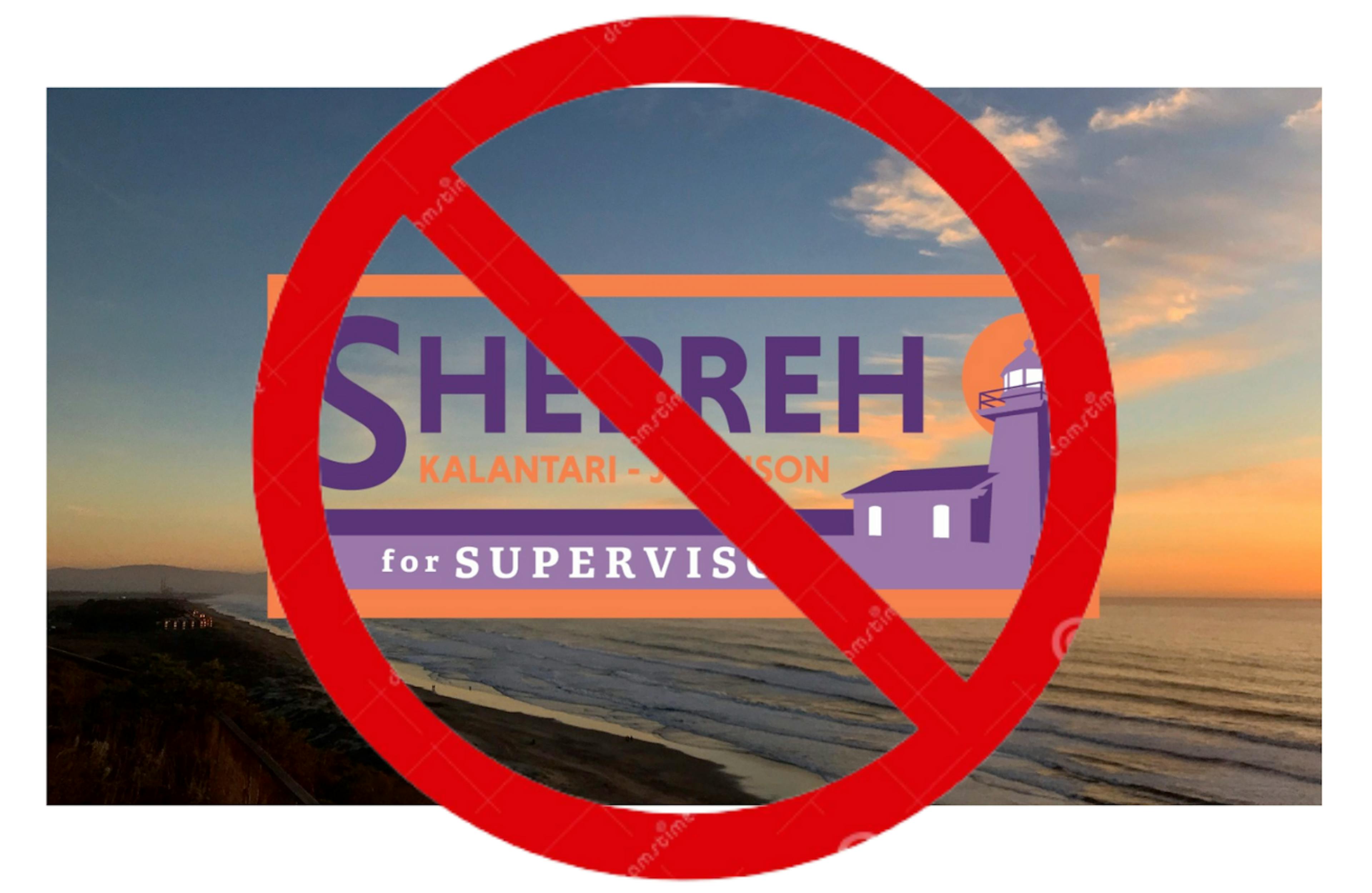
In a recent article in Lookout Santa Cruz, in which Kalantari-Johnson responds to those who oppose the OVO, she is quoted as saying, unfoundedly: “I think that sometimes people just want to say ‘no’ and push back, maybe because there’s fear of the unknown.” It’s another common reframing technique of Shebreh’s, deployed in response to those who provide research-backed critique of her policy proposals. This maneuver creates a false reality for the public: Do nothing, or move forward with services that are predicated on criminalization. It’s as if those who oppose the latter are by default supporting doing nothing. At many council meetings, after receiving strong community objections to the well-known consequences of quality-of-life ordinances on unhoused people, Kalantari-Johnson and her cohort gaslight critics by saying things like, “it is not compassionate to do nothing.” With such expressions, she creates a false binary, even in the face of comment after comment offering practical, researched, nonpunitive alternatives to criminalization. It is not the unknown that we fear, but what we do know of Shebreh’s policies.
There is a term for Shebreh’s rhetoric, and it’s called “care-washing”—the use of social justice language like “equity” and “restorative justice” to promote opposite ends, in this case the criminalization of unhoused folks.
Care-washing is usefully discussed by sociologist Chris Herring as a form of “therapeutic penal populism.” He explains that anti-homeless ordinances (also known as quality of life laws) are legitimized by the use of caring language and framed as helping people access services, despite prioritizing penalization. Herring details how in “progressive” cities like Santa Cruz, it has fallen out of favor to portray efforts to criminalize homelessness as explicitly punitive. Instead, laws criminalizing poverty have increasingly been portrayed as therapeutic efforts at assisting unhoused people via police enforcement. But doing so, politicians make an insincere call for “care” based on highly stigmatized stereotypes of people experiencing homelessness in order to justify the need for “tough love” and “law and order”—what ultimately amounts to a carceral response--be that typical policing, involuntary commitment, or other forms of coercive care, disguised through the rhetoric of faux-compassion.
But such rhetoric ignores how policies like OVO and CSSO have repeatedly proven to be ineffective, expensive, and harmful to people experiencing homelessness as well as to surrounding communities. We’ve already seen it in our own city. Following the Santa Cruz police department’s implementation of “Operation Westside Story” in August 2021, which targeted oversized vehicles for ticketing and towing, multiple people were left newly unsheltered, sometimes with all of their belongings (including medications and mobility devices) confiscated by the city.
Shebreh has consistently discouraged any critical scrutiny of her anti-homeless ordinances; instead, she tries to make their criminalizing nature seem like insignificant redundancies while seeking to delegitimize her critics. In a February 2021 op-ed in the Sentinel about the Temporary Outdoor Living Ordinance (which eventually turned into the Camping Services and Standards Ordinance), Kalantari-Johnson argues that, despite critique of the proposed Temporary Outdoor Living ordinance, “it is not enough to say we want to do something about this issue and not act, simply because the action is incomplete or imperfect. It will never be perfect.”
“To not let perfect be the enemy of good” is an expression and sentiment that Shebreh and her collaborators have variously expressed at virtually every council meeting where homeless policies are discussed. This willingness to overlook problems, especially when coupled with the misguided overvaluation of compromise, is dangerous and flawed. Compromising with people who hold bigoted and misinformed views about unhoused people (even while using social justice language) has consistently led her to support policies that prioritize the comfort of housed people over the survival and welfare of unhoused people—not surprising given her funders. The “incomplete” and “imperfect” we are asked to overlook will, however, actively increase unsheltered homelessness, disability, and premature death for our unhoused neighbors, outcomes compounded along lines of race, disability, and gender and sexual identity. In this case, the colloquial refrain that it’s always better to do “something” simply to avoid doing nothing potentially becomes a deadly tool used by a group of diverse women to uphold wealthy homeowner and real estate interests. It’s ultimately just political theater, performing the empty role of doing something when it’s merely an action for action's sake, or a “something” that makes matters worse.
We can see a similar tendency to abstain from critical analysis in Kalantari-Johnson’s use of the city’s “Health in All Policies” framework seemingly more for the advancement of her political career than as an actual policy analysis tool. Health in All Policies (HiAP) was created by the American Public Health Association (APHA) in 2013 as an instrument to “address the social determinants of health that are the key drivers of health outcomes and health inequities.” According to the APHA, HiAP evaluates health policy through a health and equity lens, paying particular interest to the impact of policies on vulnerable and underresourced groups and communities. But this following quote from a Santa Cruz city staff report on the Oversized Vehicle Ordinance demonstrates a fundamentally inadequate and biased analysis:
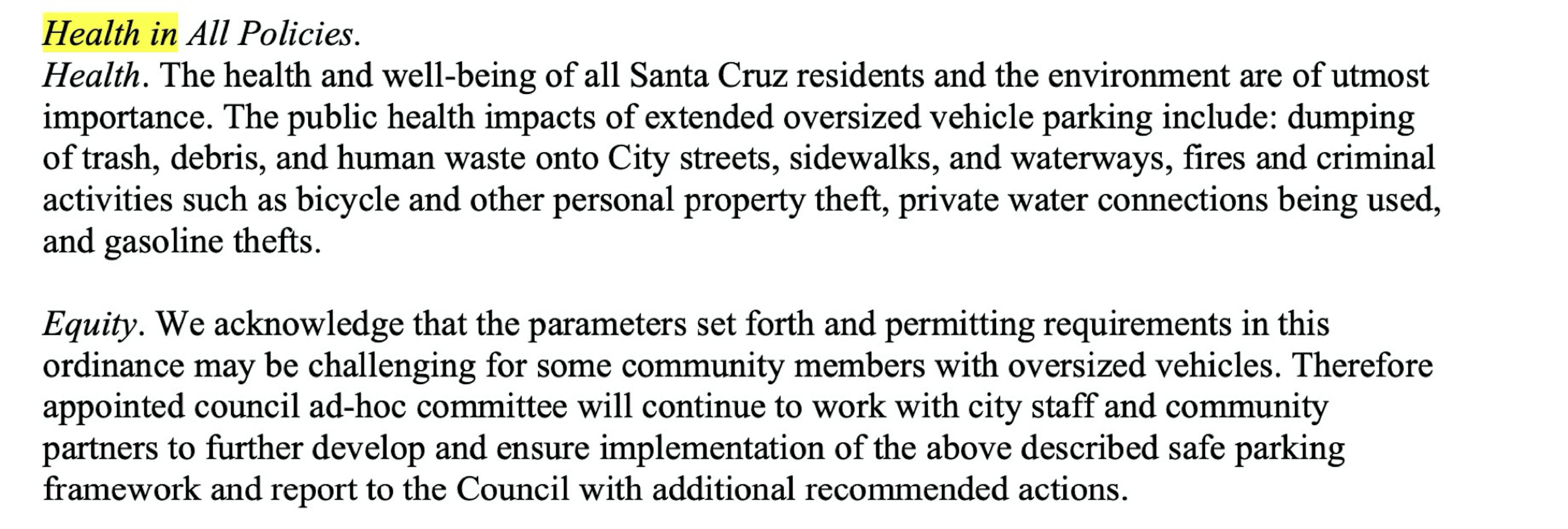
Against its spirit, the report uses HiAP effectively to codify stereotypes of people who live in vehicles into city law, providing zero analysis of how the ordinance will actually impact them, other than to say it “may be challenging for some community members.” There is no mention of the significant impacts that parking tickets cause, nor of the fact that many people living in oversized vehicles who already use existing safe parking programs can barely afford the gas required to get to and from these locations.
On her campaign website, Shebreh lists “social equity” as an issue she cares deeply about. Yet when creating policy related to homelessness, her version of equity throws the most impacted under the bus (or into the police van and jail, after they tow the bus), prioritizing the safety-obsessed interests of groups like Santa Cruz Together, Santa Cruz Neighbors, and the housing-value interests of the pro-gentrification real-estate industry. Not surprisingly given her pro-homeowner bias, she opposes Santa Cruz’s Empty Home Tax initiative, which, if passed in November, will bring much-needed funds for affordable housing by taxing homes that sit empty for eight months or more a year, even while she claims to support housing as an equity issue. In fact, Shebreh relies on a harmful and misguided link between homelessness and crime, employing the same kind of talking points one finds in rabidly anti-homeless and toxic blogs like Santa Mierda (run by one Steve Schlicht). Or, to quote from the Camping Standards and Services Ordinance, passed in 2021:
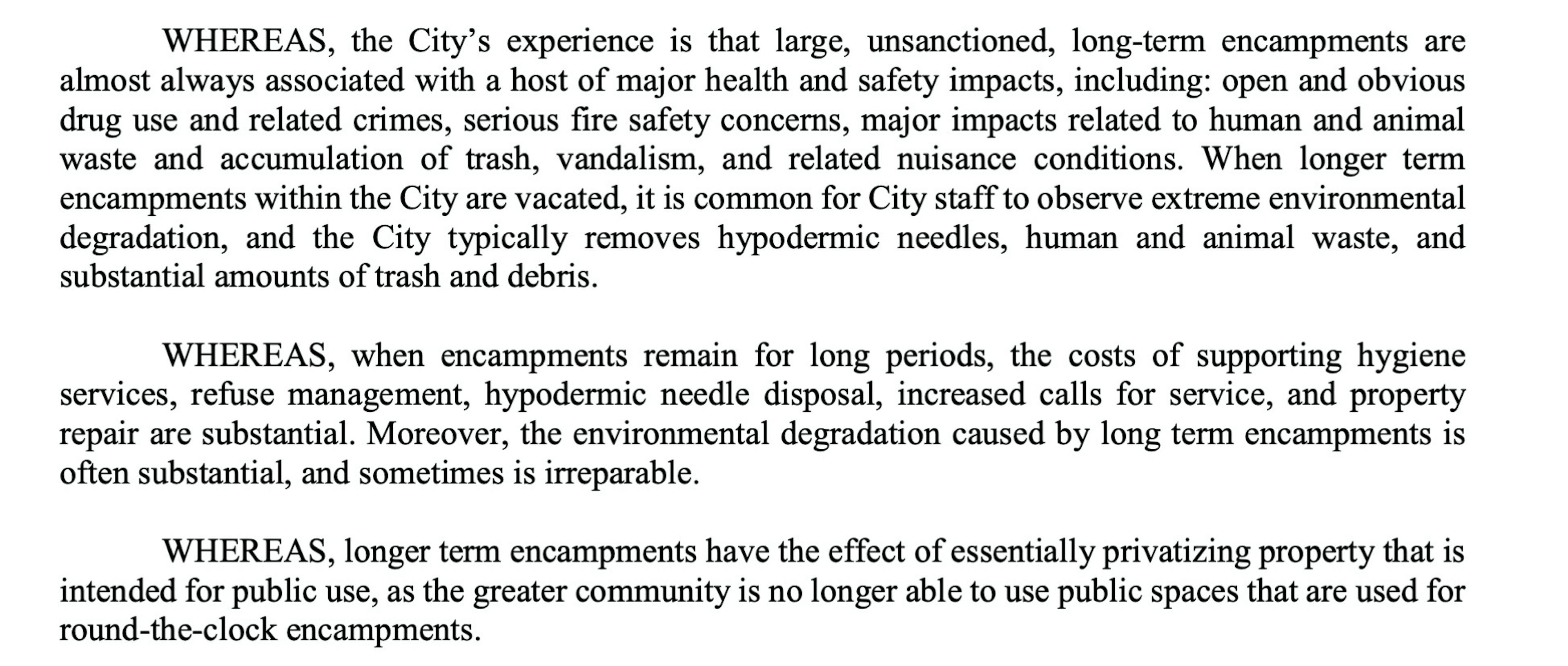
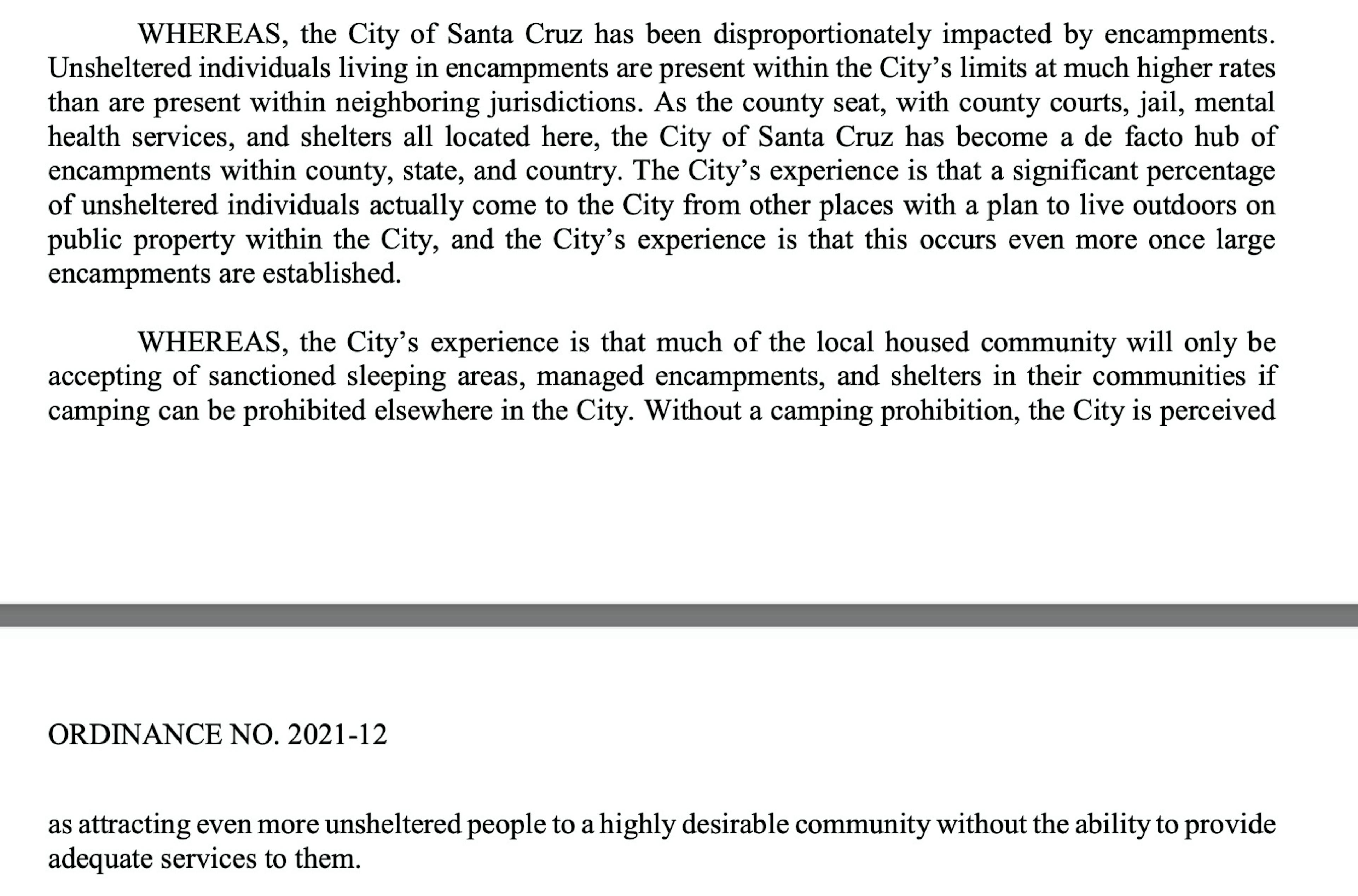
According to this ordinance’s warped perspective, tinged with eco-fascist inclinations (which reinforce dangerous generalizations that link houseless encampments with drugs, pollution, and criminality), and with demonstrable falsehoods countered by data, the city shockingly frames itself as the victim of the unhoused community. It expresses a clear misunderstanding of the power dynamics at play between cities and unhoused people, and it completely ignores the realities of systemic racism, ableism, and queerphobia at play in our systems of housing, policing, and criminal justice—something that a genuine use of HiAP would avoid.
While a close analysis of Kalantari-Johnson’s words as compared to her actions shows significant inconsistencies, particularly as they relate to homelessness policy, her actions find much congruence with her funding sources, supporters, and allies in policy making. For instance, much like her 2020 city council campaign, her present supervisor campaign has been backed by pro-policing, real estate, and developer interests generally opposed to tenant protections, including such organized groups as the Santa Cruz Together PAC and California Real Estate PAC. (Santa Cruz Together has been lambasted on social media—accurately so—as “Santa Cruz Together for Gentrification”). Santa Cruz Together, heavily funded by real estate money, were instrumental in the successful campaigns to recall Drew Glover and Chris Krohn from the city council (via the spinoff group Santa Cruz United), targeted in part because of their approach to creating compassionate homelessness policy. Shebreh has embraced the support of Santa Cruz Together, as well as that of the Santa Cruz Police Officers Association, by prominently featuring their endorsements on her campaign literature, and she plans to appear in a Santa Cruz Together gathering on May 2. It’s no secret that the real estate industry has played a major role in eroding renter protections while profiting off of discrimination in housing, and contributing to increases in homelessness while supporting its criminalization.
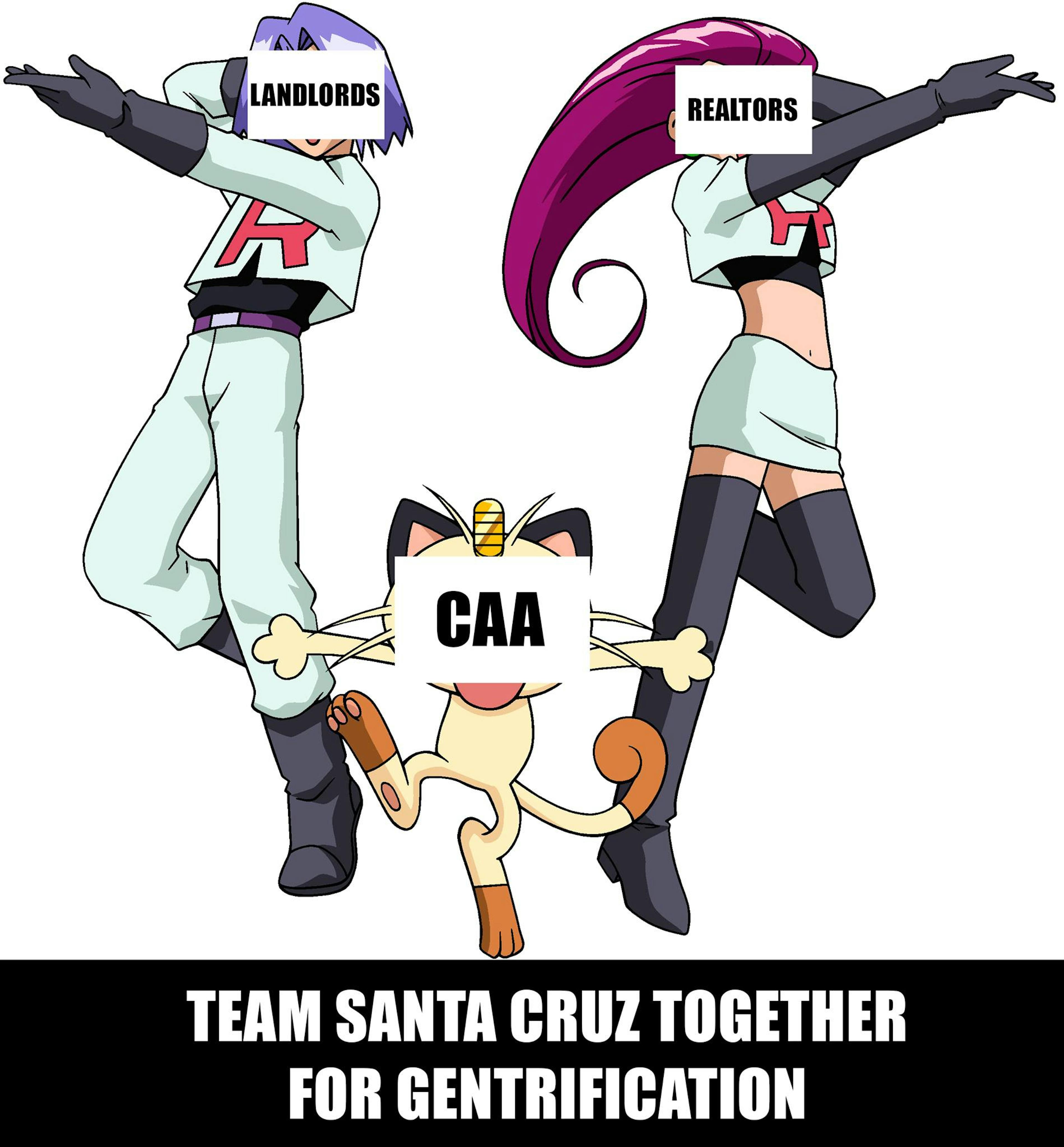
Santa Cruz Together for Gentrification meme from April 15, 2018 linking landlords, realtors, and the California Apartment Association in opposition to rent control.
One consistent supporter of Shebreh’s campaign, making contributions in 2020 and 2022, is the outspoken Santa Cruz real estate agent and antagonistic Nextdoor.com commenter Peter Cook. Commenting on behalf of Santa Cruz Together at a 4/12/22 City Council meeting about OVO, he went on a 3-minute diatribe about a “double standard” in Santa Cruz that supposedly allows people who live in oversized vehicles to not follow the same rules that housed people do. Of course, there is absolutely no truth in his claims; if anything, people who are unhoused are consistently targeted by vigilantes and the police and suffer negatively from the city’s generally anti-homeless double standards. Later in the same meeting, council member Renee Golder, who Kalantari-Johnson said worked closely with her on the OVO, agreed with the comment, saying that the idea that all members of Santa Cruz should be treated the same resonated with her, and that she agrees with commenters who said they felt like there were “two tiers of justice” in Santa Cruz—implying that tax-paying, rule-following homeowners get the short end of the stick. Immediately after espousing this offensive “All Lives Matter'' type sentiment, Golder went on to make a motion to restore OVO to its original and more harmful form, which was enthusiastically seconded by Kalantari-Johnson, leading to the removal of the humane, research-based, best practice additions to the Oversized Vehicle Ordinance that had been sensibly added by the city’s planning commission.
In this town where casting oneself Republican is generally a nonstarter, it’s the “moderate” Democrats like Shebreh who represent ruling-class interests.
The county is host to significantly more services for unhoused people than the city, and also has its own armed enforcers—sheriffs. If Kalantari-Johnson wins the election for county supervisor and can play a role in directing these two resources, she will likely take her scientifically disproven carrot-and-stick approach to homelessness policy and her affinity to real estate interests with her. Given her record, there is real reason to fear the implications for our unhoused and precariously-housed neighbors and our community at large.
Kalantari-Johnson has been singled out here because her run for supervisor demands critical scrutiny, something she has not received from the city’s generally liberal media establishment. Though she is more adept and convincing than many of her city council counterparts in care-washing the criminalization of homelessness, the tactic is not uniquely hers. It’s also commonly used by her city council voting block—Donna Meyers, Renee Golder, Martine Watkins, and Sonja Brunner—as well as city staff like planning director Lee Butler, city attorney Tony Condotti, and the many other liberal local, state, and national politicians and officials who refuse to acknowledge the failure of these carceral policies. Let us be clear: Services without the threat of criminalization are not only possible, moral, and just, they constitute the best and most compassionate approach to those most in need, an approach that is also the most data-supported, evidence-based, and effective policy prescription for mitigating the harms of homelessness.
With the US currently led by centrist Democrats largely detached from workers’ concerns, we are seeing the end of reproductive rights and continued attacks on LGBTQ+ rights, the refusal to cancel student debt, the expansion of economic inequality and affordable housing, the refusal to curb violent policing, and the failure of green capitalism to mitigate climate disaster. It’s not that Shebreh supports every one of these directions, but rather that her positions have supported the liberal elite politics that have generally let down the many in favor of the few, mirroring the national electoral context. Given Shebreh’s real-estate financial backers, her criminalizing policies, her care-washing rhetoric, and her opposition to working-class and tenant interests—evidenced in her city council record—she is not the candidate to represent us on the Santa Cruz County board of supervisors.